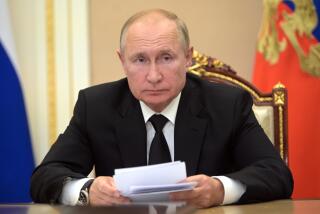Oil Flow Could End, Yukos Says
- Share via
MOSCOW — Facing the imminent seizure of the company’s core production unit, Yukos Oil’s management said Thursday that the firm could run out of cash by mid-August, threatening the temporary loss of up to 1.7 million barrels a day in Russian oil production.
Indicating that negotiations with the Russian government to save the company appeared to be futile, Yukos senior managers said they had little remaining hope of accumulating enough money to keep the firm afloat.
There were signs that the Russian government was preparing to break apart the oil giant and sell it off at bargain-basement prices, analysts said -- a move that would jeopardize not only the billionaire oligarchs now controlling Yukos but also thousands of private investors who hold up to $2.5 billion of Yukos stock.
The company’s collapse could disrupt -- for weeks, or even months -- Yukos exports of 700,000 barrels of oil a day, primarily to customers in Eastern Europe. State-run Russian pipeline operator Transneft said it could quickly find other suppliers to make up the shortfall, but analysts predicted an almost certain effect on global oil prices should Russia’s biggest producer even temporarily halt production. Yukos produces about 1.7 million barrels of oil a day, equal to some OPEC countries.
“If no alternative solutions are found, the restricted access that we have to our cash means that we will essentially run out of cash, and not be able to fund our business, operating expense and obligations sometime during the first half of August. So, not a lot of time here,” Yukos Chief Executive Steven Theede told reporters.
Since the arrest in October of former CEO Mikhail Khodorkovsky, now on trial on charges of fraud and tax evasion, the financial community has debated the Russian government’s decision to assess at least $8 billion in back taxes against Yukos: Was it to punish Khodorkovsky for his political activism and alleged financial misdeeds, but leave his company intact? To hand control of the company to more compliant owners? Or destroy a company that produces 2% of the world’s oil supply?
This week, many analysts were leaning toward the doomsday scenario.
“The Russian equity market faces the grim prospect of the entire equity value of Yukos being destroyed by the state,” UFG Financial Group said in a grim commentary Thursday.
The turning point came this week, when court bailiffs moving to execute an initial $3.4-billion tax judgment announced that they were preparing to seize and sell not one of the dozens of small Yukos assets that might easily settle the tax bill, but the company’s main production unit, Yuganskneftegaz.
The Siberian oil facility produces 60% of Yukos’ oil output. “Yuganskneftegaz ... is our primary asset and is essentially the backbone of our company,” Theede said. Losing it, he said, “would be a very serious blow to the company and would certainly put our ability to continue as a going concern under question.”
Yuganskneftegaz is probably worth about $30 billion -- nearly nine times the tax bill due for the year 2000, company officials and industry analysts said. But the two-month deadline for selling the company means there would be little time to raise financing, and a potential buyer probably would acquire it at a fire-sale price, analysts said. The government listed the unit’s official value at about $1.8 billion.
“We believe that if that asset is sold by the bailiffs, we probably can’t plan on getting any change back from the proceeds,” Theede said.
Under current conditions, analysts said, the most likely buyer would be a government-owned energy company -- in effect a renationalization of an oil company Khodorkovsky bought at a steep discount during controversial 1990s privatizations.
“We can state that the idealistic impression that Russia is a country where you can do business, which stubbornly existed until recently, is a thing of the past now,” said Yulia Latynina, analyst for Echo of Moscow radio.
Company managers said they had sent 11 settlement proposals to various government ministries -- including an offer to pay the $8 billion over time -- but there had been no responses.
“I have tried to be in contact with senior officials in the government from the moment of my appointment,” said Viktor Gerashchenko, recently named board chairman. “But the polite secretaries of these officials kept on saying that they were busy, in a meeting, at the talks ... and couldn’t I call again.”
Steven Dashevsky, an analyst with Aton Capital Group, said, “The political decision has been made to leave Khodorkovsky penniless when he gets out of prison.” With the political die already cast, he added, Yukos’ “negotiating position is not weak, it’s nonexistent.”
More to Read
Sign up for Essential California
The most important California stories and recommendations in your inbox every morning.
You may occasionally receive promotional content from the Los Angeles Times.













